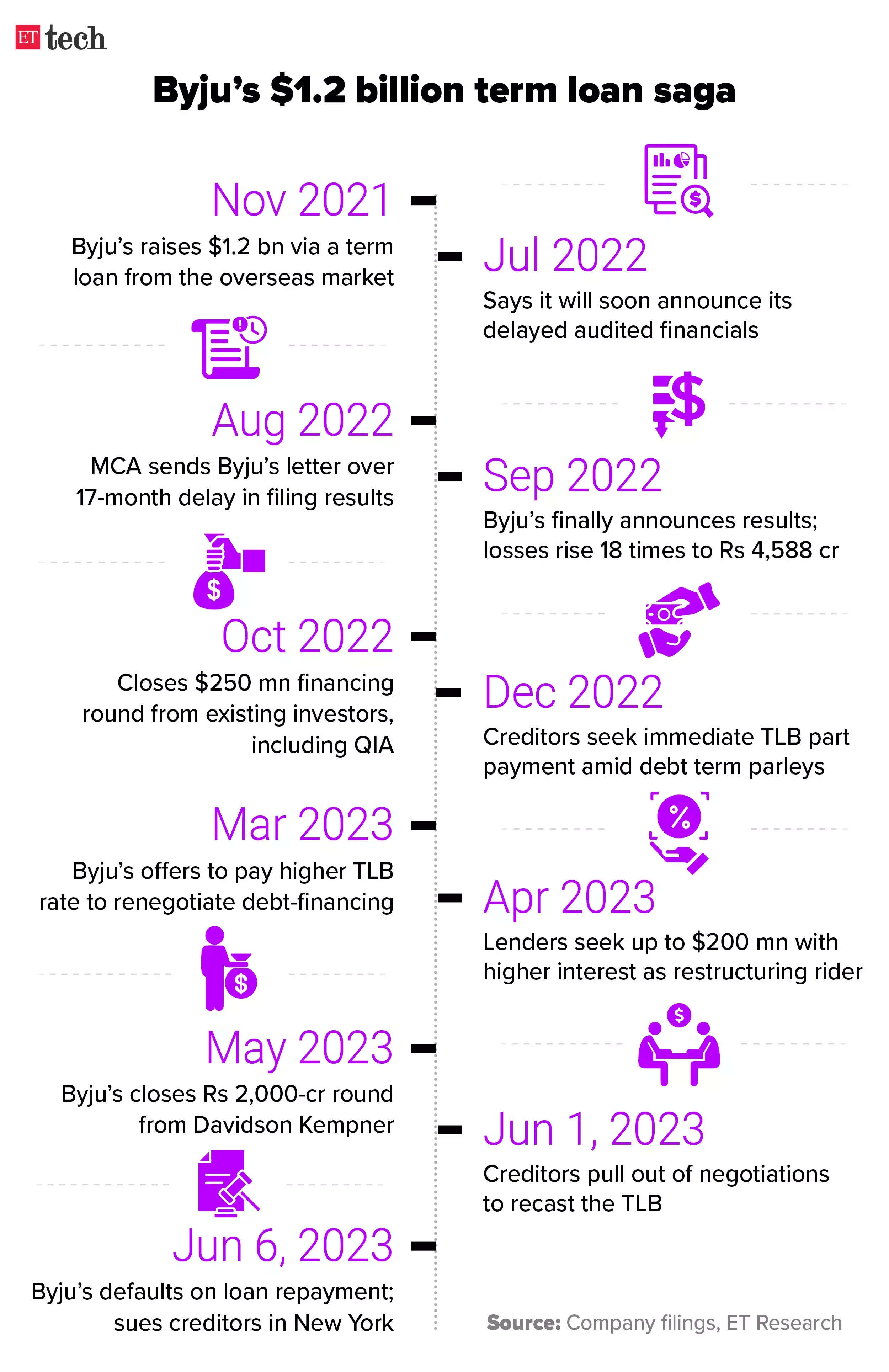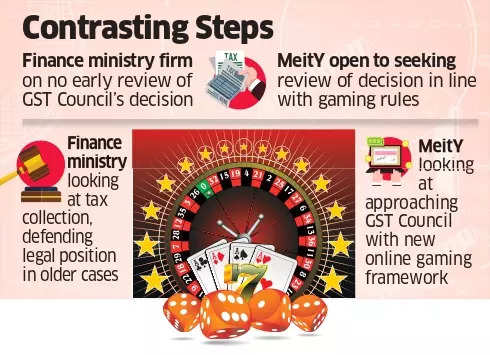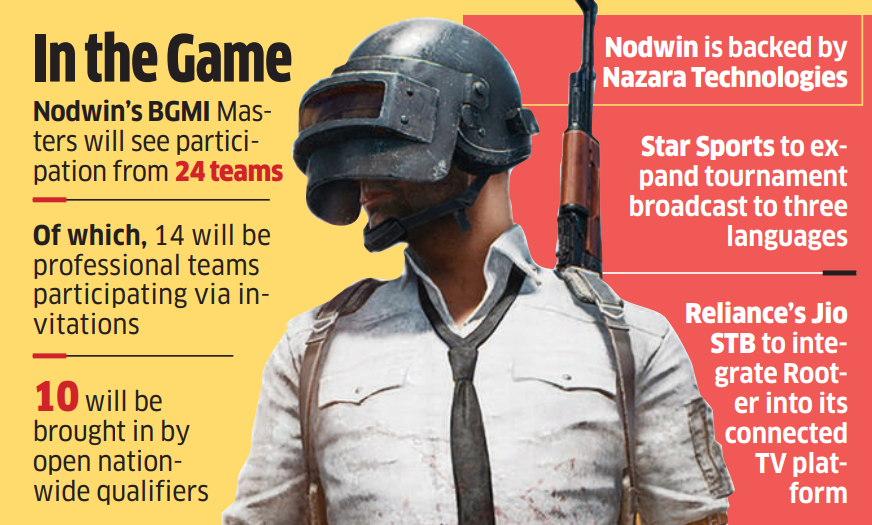Exclusive: Byju’s, lenders make peace; 28% eGaming GST causes rift in government
Also in the letter:
■ Startups to get export promotion sops
■ Tech industry against over-regulation of AI
■ Indian television doubles down on esports bet
Exclusive: Byju’s, creditors to rework terms of $1.2 billion loan

Embattled edtech major Byju’s has reached a tentative agreement to rework its loan agreement with lenders who collectively own more than 85% of the $1.2 billion term loan B, people aware of the matter told ET. An announcement in this regard is expected early Monday.
New deal: According to the new terms, Byju’s and the group of lenders have agreed to work towards an amendment prior to August 3, 2023. If the terms are successfully reworked, the creditors will drop their demand for accelerated repayment.
More details: Additionally, all ongoing litigation could come to an end while avoiding further enforcement actions initiated by the lenders.
Sue for peace: A formal agreement with lenders would be of considerable significance for Byju’s, as differences with them over the $1.2 billion loan has emerged as a key pain point for the firm. Both Byju’s and the lenders had also sued each other in US courts. In fact, the group of lenders had issued a joint statement on June 9 saying Byju’s lawsuit was ‘meritless’.
Say what? In a term loan B, borrowers aren’t required to service the principal upfront, unlike a regular loan where the interest plus a part of the principal is paid throughout the tenure. By backloading the payment of the principal, borrowers have the flexibility to invest in growing the business.

Quick recap: Fighting a series of crises, Byju’s has roped in former State Bank of India chairman Rajnish Kumar and former Infosys chief financial officer Mohandas Pai on its board advisory committee (BAC) to guide it on governance.

This is Pranav Mukul in New Delhi. Following the GST Council’s decision on July 11 to impose 28% tax on online gaming at full face value, a difference of opinion has emerged between two wings of the central government — the finance ministry and the ministry of electronics & information technology (MeitY).
Tell me more: As companies in the sector scrambled to seek clarity and potentially a review of the decision taken by the GST Council, which has representation from the state governments, the finance ministry has said that an early review of the decision was unlikely.
Also read | Online gaming companies await clarity as repeat taxation fears rise
Yes, but: Last week, minister of state for IT Rajeev Chandrasekhar had said that MeitY will approach the GST Council and urge it to consider reduced taxes under the new framework for online gaming announced by his ministry, but only after the framework is actually in place.

Divergent views: Even as MeitY is understood to be considering presenting its view to the GST Council — a move to which companies in the sector are looking forward — next steps for the tax department include defending its legal position in cases where it has raised demands for GST.
Quote, unquote: “There were statements that the deliberations around the GST Council’s decision on online gaming were on moral and ethical grounds, but the MeitY does not consider all real money games as gambling or betting,” a senior government official told ETtech on the condition of anonymity.

The suggestion of the Telecom Regulatory Authority of India (TRAI) to set up an independent body to regulate artificial intelligence (AI) and supervise its growth has sent alarm bells ringing in the technology industry, which views this as an impediment to the growth of the viral technology.
Industry stance: Ashish Aggarwal, vice president and head of public policy at Nasscom, while agreeing that the development and deployment of AI needs oversight to ensure responsible use, strongly advised against creating more laws or a statutory authority.
“Disjointed and disproportionate regulatory intervention can impede the growth of the evolving AI ecosystem in India and cause avoidable uncertainty,” he argued. Nasscom comprises over 3,000 companies from the technology industry. Aggarwal said that the existing regulatory framework and enforcement capacity should be updated.

AI, TRAI: TRAI has suggested that an independent statutory authority, the Artificial Intelligence and Data Authority of India (AIDAI), be established immediately for development of responsible AI and regulation of use cases.
Too many cooks: Kazim Rizvi, founder of public policy think-tank The Dialogue, questioned the need for a separate AI regulator when the country already has various other regulators in the making, including the proposed “internet regulator” within the upcoming Digital India bill.

Roughly two months after the return of the popular online game Battlegrounds Mobile India (BGMI), Star Sports is expanding its broadcast of the upcoming BGMI Masters tournament to three languages and multiple channels, while Reliance’s Jio set top box (STB) has integrated the streaming platform Rooter, the official online streaming partner for the tournament.
Advertising: “More than 40% of the audience last year were below the age of 21. We were able to attract a lot of firms that had invested in sporting properties, but not in esports”, said Sanjog Gupta, Head of Sports for Disney Star. The first season (last year) had food delivery major Swiggy, automaker Hyundai, and FMCG firm Gillette among the advertisers.

High hopes: Television coverage has boosted the acceptance of esports as a career, said Harsh ‘Goblin’ Paudwal, a BGMI `athlete’.
A government block on the game was lifted only two months ago and it is still under a three-month trial period. Industry executives, however, remained confident. “The way Krafton has addressed government concerns and brought the game back, touchwood, it is here to stay. The investment from large firms like Star Sports and Nodwin is also indicative of that confidence”, said Piyush Kumar, founder and chief executive at Rooter.
Paytm targeting positive free cash flow by year-end: CEO Vijay Shekhar Sharma

One 97 Communications, the parent of Paytm, is aiming to generate positive free cash flow by the end of this year, chief executive Vijay Shekhar Sharma said on Saturday, a day after the digital payments company reported a narrower loss for the first quarter.
CEOspeak: “We remain committed to generate free cash flow by the year end, you must have seen we have already started adding to our cash reserves,” Paytm tweeted, quoting Sharma.
Results: One 97 Communications, which operates the Paytm brand, reported on Friday that its consolidated quarterly loss fell 44.4% from a year earlier, to Rs 358.4 crore, for the quarter ending June 30. Revenue from operations for the payments major stood at Rs 2,341.6 crore for the June quarter, a 39.4% increase on year.
Startups, new companies to get export promotion sops

In order to boost India’s declining exports, the government has rolled out incentives for startups and new exporters, while easing compliance requirements for existing ones.
Fly for free: Under the Market Access Initiatives (MAI) scheme, startups and new exporters are eligible for airfare reimbursement when they participate in overseas events. For existing investors, the ceiling for this incentive has been raised by 20%. The benefits of higher airfare reimbursements will also apply to exporters when they host foreign buyers in India.
Shrinking exports: India’s goods exports shrank the most in three years to $32.97 billion in June, a 22% on-year decline. Under the scheme, financial assistance is provided for export promotion activities. Earlier, new exporters and startups didn’t get such incentives, but now those with an annual turnover of Rs 50 lakh will get some support.
Trade fair plans: India plans mega trade fairs for food, textiles and auto components, on the lines of Messe Frankfurt, Gulf Food, and Canton Fair, to achieve 12% growth in goods exports by 2030.
Other Top Stories By Our Reporters

Whither, Indian short video apps? | After TikTok was banned by the government in 2020, a dozen homegrown venture capital-funded apps emerged to fill the void left by ByteDance’s flagship platform in India. Three years later, most of these short video apps have pivoted, merged, or simply disappeared.
IT biggies ask employees to work from office more often: Top Indian software exporters and mid-tier firms are asking employees to work from the office on more days of the week. This comes as companies are focusing on higher productivity and employee retention.
India is key to data centre focus of chip firm AMD: In an interaction with ETtech, Vinay Sinha, corporate vice president – India Sales, AMD, said that more than 6,000 engineers in India are closely looped into every aspect of the data centre business, and that the company has seen its business double in the past two years.
Global Picks We Are Reading
Fake passports, real bank accounts: How TheTruthSpy stalkerware made its millions (TechCrunch)
The music streaming app for those who can’t pay for downloads (Rest of World)
Startups seek to challenge Nvidia’s dominance over AI chip market (Financial Times)
For all the latest Technology News Click Here
For the latest news and updates, follow us on Google News.

